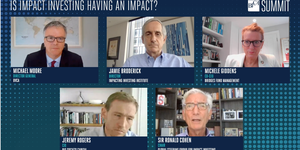The venture ecosystem has the potential to be a powerful catalyst for change, with technology playing an increasingly important role in developing products and services that better meet peoples’ daily needs. While traditionally this ecosystem has been somewhat agnostic towards impact, we’re seeing a growing focus on this area, in part evidenced by the ten-fold increase in impact venture fund pitch decks that have landed in our inboxes this year compared to 2018.
Previously, we’ve spoken about how being an impact manager starts with impact intent and then building value-add and proportionate impact practice to deliver on that intent. Here we want to unpack the latter, viewing impact practice as applying an impact lens in established systems, processes and decision-making. This enables managers to optimise for impact in their investments, ensuring long term (financial and impact) value creation.
This is an emerging area and the ecosystem is still very early on in the journey of getting to what good looks like. Acknowledging this, many ecosystem actors have developed standards and guidance documents to support investors on this journey. Examples include the IFC’s Operating Principles, the GIIN’s Core Characteristics of impact investing and the UN’s SDG Impact Standards.
With more and more VCs looking to establish impact best practices, we wanted to share what we think good looks like using one of our managers, Ascension who run the Fair by Design Fund (FBD), as an example. We’ve structured this against the key areas of impact practice focussing on areas where it drives value.
Fund impact strategy and goals
FBD focuses on eradicating the UK poverty premium, which refers to the premium people pay for goods and services because they are experiencing poverty. For example, people on lower incomes generally pay higher interest rates when borrowing or are unable to access the lowest costs for energy because they can’t afford to pay lump sums for services in advance. Statistically, experiencing poverty costs the average low-income household an extra £490 a year (20% of UK households), and for one in ten of these households, this goes up to £780 annually, according to Personal Finance Research Centre at University of Bristol.
FBD invests in early-stage technology companies that are tackling some of the structural challenges which lead to the poverty premium such as information gaps in credit scoring resulting in ineligibility for affordable credit. The fund invests where evidence of the social issue is backed by academic research, and as a result, prioritises sectors including energy, affordable finance, mobility and food & household goods. Examples include improved credit scoring through Open Banking or increasing ability to switch energy providers through increased transparency and accessibility of information.
What stands out about FBD from an impact practice perspective are two principles which underpin its strategy:
- It has a clear and measurable impact goal: to eradicate the poverty premium by 2028.
- An investment strategy to achieve that goal which is underpinned by evidence and academic research.
This gives us confidence that the impact thesis for the fund is likely to bring about the change we want to see. Not all funds will be as focussed as FBD, however, we’ve seen generalist funds use impact goals to good effect. These are usually set for different focus areas within a broader thesis and each investment is then evaluated on the contribution it could make towards achieving that goal.
Making impact investments
Impact returns and risk assessment
Designing an investment thesis aligned with academic research means that FBD knows what to look for in terms of assessing impact risks and returns. The team are particularly thoughtful about business models which enable impact to be maximised. For example, the use of B2B2C models to separate the customer from the beneficiary (thereby extending reach to those on lower incomes) or embedding user voice into their process to better understand impact risks (see Decision-making).
Decision-making
Each investment memo has detailed sections on the investment’s impact thesis, contribution to poverty premium reduction and KPIs that will be used to track progress over time. This ensures that the investment committee can incorporate impact into their decision making in a meaningful way. Being explicit about impact also allows investments (or ongoing portfolio management) to be structured in a way that enhances the impact created and ensures that the fund level impact goals are being met.
In partnership with Toynbee Hall, FBD has set up a Lived Experience panel which allows individuals with lived experience of poverty to support the due diligence process. Before bringing a potential investment to the Investment Committee (IC), the prospective investee presents their product to the panel allowing them to provide feedback on whether they think the product meaningfully addresses the issue. This feedback is shared as part of the IC papers and leads to a more informed decision around impact. The ventures themselves also find this process insightful as they receive early customer feedback on their solution.
Managing impact investments
Impact measurement
FBD establishes a set of impact KPIs for each portfolio company (see below) with data flowing back to FBD on a six-monthly basis. To validate some of the learnings from this internal data, FBD, in partnership with Big Society Capital and 60 Decibels, is undertaking an external evaluation of two portfolio companies. The findings from the first evaluation are complete and have provided supporting evidence of some assumptions and interesting challenges on others. These processes are key to iterating towards a business model that can deliver impact and so we’re excited that FBD is going the extra mile to test assumptions and learn from the data that flows back.
Reporting and learning
FBD publishes quarterly updates on impact to its investors. These include impact highlights from the previous quarter as well as impact KPIs for each portfolio company (KPIs are updated every six months). Examples include the number of people reached, who is being reached and savings incurred. Alongside this, FBD publishes an annual impact report which provides further updates including converting the above metrics into reductions for the poverty premium for all portfolio companies. This helps FBD track progress towards its overall fund goal and adjust strategy where necessary. The poverty premium calculations are underpinned by research done by the University of Bristol which provides an element of rigour and independence to the process.
Impact practice within venture is an emerging area
Fair By Design was set up to tackle a social issue that affects millions of people in a sizeable way. The systems, tools, processes and decision making around impact are critical if FBD’s goals are to be achieved. The above demonstrates that FBD is meaningfully thinking about how best to incorporate impact in the traditional investment cycle.
As more managers become thoughtful about impact, what is considered good impact practice will evolve over time. We are excited about the progress taking place and look forward to working with the ecosystem to move things forward.


